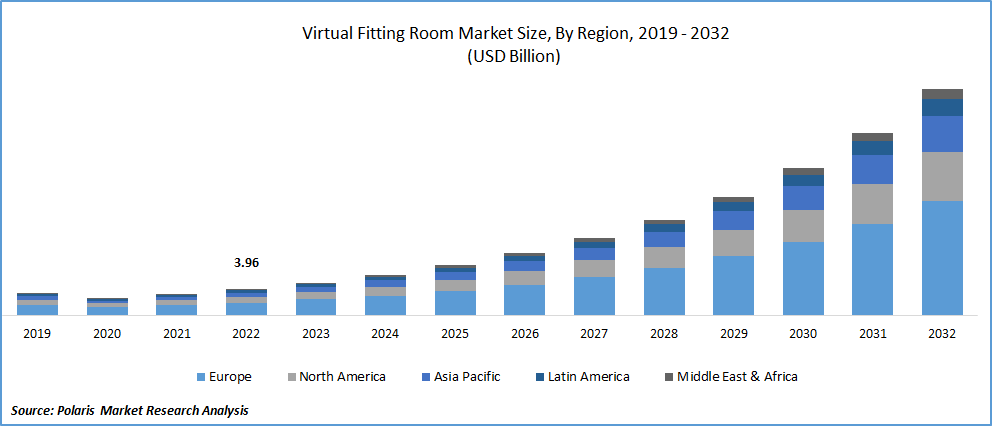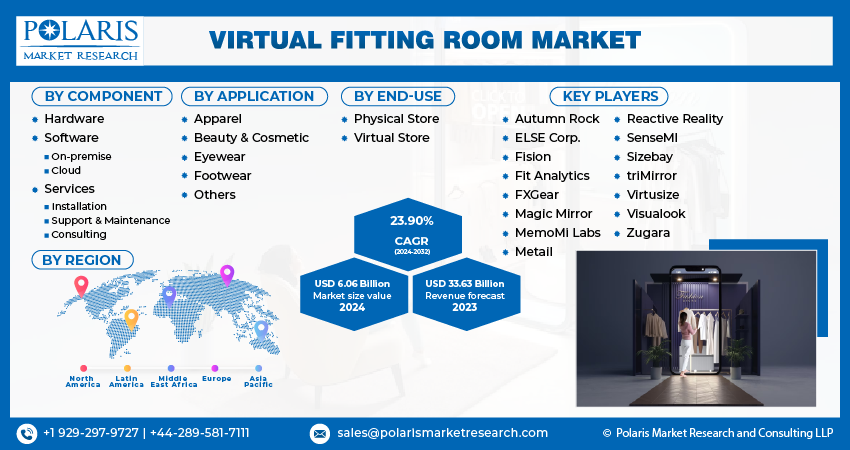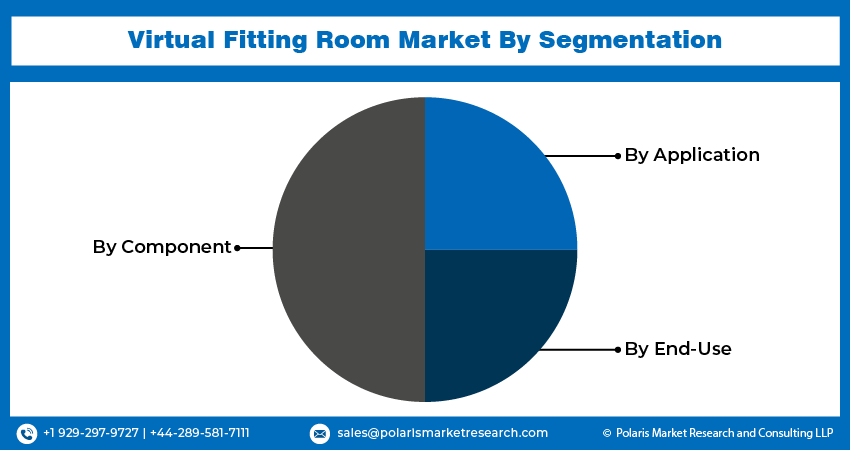
Virtual Fitting Room Market Share, Size, Trends, Industry Analysis Report, By End-use (Physical Store, Virtual Store), By Component, By Application, By Region, And Segment Forecasts, 2024 - 2032
- Published Date:Jan-2024
- Pages: 116
- Format: PDF
- Report ID: PM3816
- Base Year: 2023
- Historical Data: 2019-2022
Report Outlook
The global virtual fitting room market was valued at USD 4.9 billion in 2023 and is expected to grow at a CAGR of 23.90% during the forecast period.
The market for virtual fitting room solutions is projected to experience substantial growth due to the emergence of Virtual Reality (VR) and augmented Reality (AR) technology. These technologies offer improved realism and immersion, leading to an enhanced user experience. Many companies are actively exploring the integration of VR shopping experiences into their physical stores and online platforms to provide customers with a more engaging purchasing journey.

To Understand More About this Research: Request a Free Sample Report
These rooms act as platforms between customers & fashion brands, with the goal of boosting customer confidence and reducing return/exchange rates caused by sizing and fitting issues. The growing prevalence of intelligent technologies, including efficient lenses, smart mirrors, & smart-phone cameras, is projected to fuel the demand for such room technology in the foreseeable future.
The accessibility of virtual fitting room experiences has been significantly enhanced through the availability of smartphone applications worldwide. Consumers now have the convenience of using their smartphones or tablets to try on clothes, making it easier for on-the-go shopping and improving the overall shopping experience. Additionally, body scanning technologies are being used to generate virtual avatars resembling their physical selves. This technological advancement is anticipated to drive market demand in the coming years. Furthermore, e-commerce retailers are increasingly integrating virtual fitting rooms into their online platforms.
In response to the challenges posed by the pandemic, retailers have adopted innovative strategies to deliver immersive shopping experiences. This has led to the integration of VR AR technology, bridging the gap between physical and virtual fitting rooms. Additionally, brick-and-mortar retailers are increasingly transitioning to online services, recognizing the advantages of web and mobile applications that require minimal human interaction. Consequently, the use of virtual fitting rooms for online purchases is expected to witness a surge in demand throughout the forecast period.

Growth Drivers
Expanding online clothing shopping demand.
The increasing demand for online clothing shopping is a pivotal driver propelling the Virtual Fitting Room Market. In recent years, e-commerce has witnessed exponential growth, revolutionizing the way consumers purchase clothing and accessories. This shift in consumer behavior has led to a corresponding need for innovative solutions that address common challenges associated with online shopping, particularly regarding size and fit.
Virtual fitting rooms offer a dynamic and interactive way for consumers to try on clothing virtually, helping them make more informed purchasing decisions. This technology bridges the gap between the digital and physical shopping experiences, providing shoppers with a realistic sense of how garments will fit and look on their bodies.
As consumers increasingly embrace the convenience and accessibility of online shopping, retailers and e-commerce platforms are integrating virtual fitting room solutions into their websites and apps. This trend not only enhances customer satisfaction by reducing the likelihood of returns due to sizing issues but also contributes to improved brand loyalty and increased sales, ultimately driving the growth of the virtual fitting room market.
Report Segmentation
The market is primarily segmented based on component, application, end-use, and region.
|
By Component |
By Application |
By End-Use |
By Region |
|
|
|
|
To Understand the Scope of this Report: Speak to Analyst
By Component Analysis
The software segment accounted for the largest market share in 2022.
The software segment held the largest share in 2022. Prominent industry players are directing their efforts toward targeting clients by continually advancing and innovating in the field of virtual fitting room technology. They recognize that software plays a vital role in enabling such solutions. Retailers have experienced significant revenue growth by leveraging progressive and innovative fitting room technology, underscoring the increasing demand for personalized "try-before-you-buy" software. As a result, the market is expected to witness a substantial increase in demand throughout the forecast period.
The services segment is likely to exhibit the fastest growth rate. Players are placing significant emphasis on providing consulting services to ensure the smooth and effective operation of their sophisticated offerings. Given that virtual fitting room technology is still in its early stages of development, solution providers are offering round-the-clock consultation services to assist clients in maximizing the utilization of the software for their retail businesses. This concerted effort is expected to drive market growth during the forecast period.
By Application Analysis
The beauty & cosmetics segment is projected to witness the highest growth over the forecasted period.
Beauty & cosmetics segment is projected to grow at a healthy CAGR. The increasing popularity of e-marketplaces has prompted well-known beauty and cosmetic brands to transition towards online product deliveries. Virtual try-on technology, which initially faced challenges in achieving widespread adoption, has recently gained momentum due to its ability to enable consumers to virtually test various looks and gather valuable data on retail brands. This trend is anticipated to drive the growth of the market in the coming years.
The apparel segment led the industry market with a substantial market share. Apparel sales generate significant revenue in both online and physical retail channels, but they also tend to have higher rates of exchanges and returns. In order to mitigate these instances and enhance the shopping experience for customers, online apparel retailers are implementing fitting room solutions powered by artificial intelligence. These solutions leverage customers' past searches and purchases to recommend appropriate sizes, designs, and styles, thereby reducing returns and improving customer satisfaction.

Regional Insight
Europe dominated the global market in 2022.
The Europeans dominated the global market with a considerable share in 2022. This growth can be attributed to the presence of numerous renowned fashion brands in the region. Furthermore, the increasing demand for enhanced customer buying experiences and the escalating competition among retailers have driven the adoption of innovative digital technologies.
Asia Pacific region registered the fastest growth rate. The increasing demand for innovative and advanced solutions that facilitate prompt purchasing decisions is anticipated to drive the growth of the regional market. Moreover, the region holds a significant market share in the e-commerce sector, with countries such as India, China, Japan, & South Korea surpassing other regions. This strong presence in the e-commerce market is expected to propel the region’s growth prospects.

Competitive Insight
The virtual fitting room market is fragmented and is anticipated to witness competition due to several players' presence. Major service providers in the market are constantly upgrading their technologies to stay ahead of the competition and to ensure efficiency, integrity, and safety. These players focus on partnership, product upgrades, and collaboration to gain a competitive edge over their peers and capture a significant market share.
Some of the major players operating in the global market include
- Autumn Rock
- ELSE Corp.
- Fision
- Fit Analytics
- FXGear
- Magic Mirror
- MemoMi Labs
- Metail
- Reactive Reality
- SenseMI
- Sizebay
- triMirror
- Virtusize
- Visualook
- Zugara
Recent Developments
- In March 2022, Walmart introduced a virtual try-on tool that enables customers to virtually try on clothing items using a personalized virtual model that matches their specific body type, hair color, and skin tone.
- In August 2022, Be Retail Social, a platform specializing in virtual try-on & virtual fitting room solutions, unveiled its inaugural customer product, known as
- “Get Cutie”. This category focuses on offering vintage-inspired handmade garments. Notably, Retail Social is the first fashion retailer to utilize accelerator and extension services, enabling customers to try on the garments using an avatar virtually. This technology assists customers in making informed purchasing decisions based on their virtual try-on experience.
Virtual Fitting Room Market Report Scope
|
Report Attributes |
Details |
|
Market size value in 2024 |
USD 6.06 billion |
|
Revenue Forecast in 2032 |
USD 33.63 billion |
|
CAGR |
23.90% from 2024 – 2032 |
|
Base year |
2023 |
|
Historical data |
2019 – 2022 |
|
Forecast period |
2024 – 2032 |
|
Quantitative units |
Revenue in USD billion and CAGR from 2024 to 2032 |
|
Segments Covered |
By Component, By Application, By End Use, By Region |
|
Regional scope |
North America, Europe, Asia Pacific, Latin America; Middle East & Africa |
|
Customization |
Report customization as per your requirements with respect to countries, regions, and segmentation. |
FAQ's
The global virtual fitting room market size is expected to reach USD 33.63 billion by 2032.
Key players in the market are Autumn Rock, ELSE Corp., FXGear, Metail, Fit Analytics.
The global virtual fitting room market is expected to grow at a CAGR of 23.9% during the forecast period.
The global virtual fitting room market is expected to grow at a CAGR of 23.9% during the forecast period.
The virtual fitting room market report covering key segments are component, application, end-use, and region.
